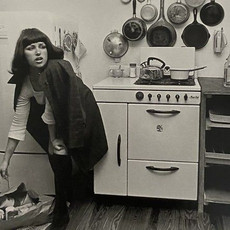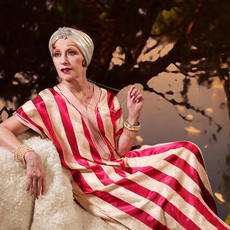Celebrating influential creative women and organisations this International Women's Day
- Mar 8, 2021
- 4 min read
Written by Imogen Morris & Molly Locke
Happy International Women’s Day! We wanted to celebrate by highlighting four key women in the creative industries and their impacts on societal change for women, as well as two organisations who are supporting creative women.
Kathryn Bigelowe is the first and only woman to have ever won the ‘Best Director’ category of the Oscars, for her 2010 war film 'The Hurt Locker'. The Academy Awards is one of the most highly regarded awards shows in the film industry, with ‘Best Director’ being one of the biggest honours. In the nearly 100 years the Academy Awards have been running, only 5 women have ever been nominated for directing: Lina Wertmüller for Seven Beauties (1977), Jane Campion for The Piano (1994), Sofia Coppola for Lost In Translation (2004), Greta Gerwig for Lady Bird (2018), and of course, Bigelowe. 'The Hurt Locker' took home five other awards: Best Picture, Best Original Screenplay, Best Editing, Best Sound Mixing and Best Sound Editing. This was a huge moment for women in the film, as it showed recognition for women in a heavily male-dominated industry, and we can’t wait to see more female talent!
Left: Kathryn Bigelowe with her 'Best Director' Oscar, March 7th 2010, photograph by Jason Merritt / Right: A portrait of Aretha Franklin in 1963, photograph by Bettmann Archive
The ‘voice of Black America’, Aretha Franklin, was an American musician and civil rights activist who paved the way for female and Black empowerment, becoming a feminist icon. 16-year-old Aretha had toured with Martin Luther King in 1958 singing before he delivered his famous and powerful speeches fighting for justice and action. Her marriage to Ted White in 1961 (later divorced in 1969) was followed by domestic violence and alcohol abuse; she transferred this experience into her music – most famously her gender-flipped cover of Otis Redding’s song ‘Respect’, which was regarded a feminist and civil rights movement anthem. The 60s and 70s saw her become the most charted female in history, and her incredible four-octave voice represents history and calls for equality.
Phillis Wheatley spent the majority of her life enslaved, however became the first African American and second woman to publish a book of poems. She was born in Gambia around 1753 but was captured and enslaved, taken to America in 1761. The Wheatley family who bought her upon her arrival educated her within sixteen months so that she could read the Bible, Greek and Latin classics, as well as British literature. She published her first poem in 1767 after she began writing at the age of fourteen and travelled to London in 1773 (with financial support from the English Countess of Huntingdon) to publish ‘Poems on Various Subjects, Religious and Moral’, not only her first collection of poems but the first book ever written by a Black woman in America. Her talents were significant in the cause of the abolition movement, and she is an icon for women in literature before feminism was even created.
Cindy Sherman explores themes of feminism, sexuality, identity, femininity, and superficiality through her photography. Her work was distinct in the 70s and 80s, especially as she is considered a member of the ‘Pictures Generation’, a group of artists in the 1970s known for their critical depiction of the media. Discussions of feminism arise especially around two of her earliest works, ‘Untitled Film Stills’ (1977-80) and ‘Centerfolds’ (1981). They explore ageing as a woman, male gaze, and self-image. Sherman reflected ideas of female empowerment and independence of second-wave feminism, criticising the sexualisation of women; her photography became famous pieces for discussion of feminism and still do today.
[From left to right] 'Untitled Film Still #84' (1978), Cindy Sherman / 'Untitled Film Still #17' (1978), Cindy Sherman / 'Untitled #92 (detail)' (1981), Cindy Sherman / 'Hollywood's golden age?' Untitled #571 (2016), Cindy Sherman
Women in Film is an organisation that advocates and fights for parity in the film and television industry. Founded in 1973, Women in Film has many events and initiatives that women all over the globe can get involved in. Film finishing funds, financing aid, mentoring, production programs, annual gala's, screening series are just the start of what this amazing company have to offer. Nothing but your creativity and talent should affect your success in any creative industry, but sadly this isn't the case. There has been progress over the years but we're still far off being an equal industry, and not just in film and television. It's organisations like this that are helping women become more empowered, allowing them to be heard through their passion and creativity. If you identify as a woman and want to enter the film and television industry they will help you in so many ways, find them at womeninfilm.org.
The Guerrilla Girls are anonymous feminist activist artists that have used media, advertisement, campaigns and much more to promote gender equality in the creative industries. The Guerrilla Girls are anonymous, known for wearing gorilla masks, "our anonymity keeps the focus on the issues, and away from who we might be: we could be anyone and we are everywhere" is stated on the 'Our Story' page of their website found here. They have worked on hundreds of projects and held many interventions all over the world. In 2020, they published a collection of all their projects in a book; 'Guerrilla Girls: The Art of Behaving Badly'. They aren't afraid to call out the way our systems work and are fighting for change to allow all women to have equal opportunities and be unapologetically unafraid to follow their passions. Being a woman doesn't make you any less talented or worthy in the arts. Find out more about this amazing organisation at www.guerrillagirls.com.
Left: Geurrilla Girls' OUR STORY https://www.guerrillagirls.com/our-story
Right: 'Women in Film' The Sundance Institute Financing Intensive https://womeninfilm.org/programs/financing-intensive/
To our fellow creative women, remember you are valid. Keep making cool creations, challenging the system and expectations, and do what you love and makes you happy! Celebrate Women's Day by listening to some Aretha Franklin and watching some female-directed films, research some history of women's rights and feminism, including the many more icons we couldn't fit on this article. We discussed some more female figures in the feminist movement on our instagram story, @weareyouthmagazine, if you are interested in learning some more!
As Chimamanda Ngozi Adichie said, we should all be feminists! Stay cool, stay creative <3
















Comments